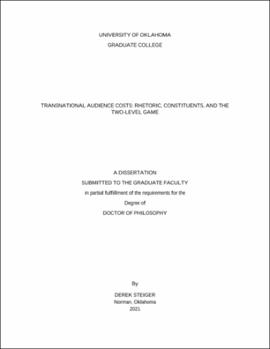| dc.contributor.advisor | Barry, Colin | |
| dc.contributor.author | Steiger, Derek | |
| dc.date.accessioned | 2021-11-19T19:32:10Z | |
| dc.date.available | 2021-11-19T19:32:10Z | |
| dc.date.issued | 2021-12 | |
| dc.identifier.uri | https://hdl.handle.net/11244/331263 | |
| dc.description.abstract | How do domestic audiences respond to belligerent rhetoric by foreign leaders? I argue that when leaders of countries that are historically adversarial engage in belligerent rhetoric directed at the adversary it has a detrimental effect on the perception of the opposing state. This generates transnational audience costs which are costs created by foreign rhetoric and imposed on the domestic political leadership. These costs constrain the range of decisionmaking of domestic leaders that can hamper future cooperation. Advancing our understanding of the role that citizens play in shaping state foreign policy is important to more accurately identifying the components that shape the international system.
To identify this phenomenon, I have developed a novel method to examine elements of survey and discursive data that highlights the intersection between rhetoric, bilateral relations, and state-society relations. Specifically, I look at available survey data, media coverage, and individual interest over time via search inquiries to identify how interested people are in what others are saying about their country and how their political leadership’s position toward the other changed following the use of hostile rhetoric. Through three empirical chapters I cover a diverse range of historical rivalries to demonstrate the range of states and relationships transnational audience costs are present in. In the dissertation I look at the China-Japan, India-Pakistan, and Greece-Turkey relationships and how the effect of rhetoric on domestic audiences changed each’s perception of the other over the time period of 2010-2019.
I conclude by outlining how I will continue to develop both the model and method used in this dissertation for use in future research. The preliminary findings presented in this dissertation highlight the importance of understanding the mutual constitutivity or inherent endogeneity of interactions at the state and international levels. Understanding this dynamic is critical to satisfactorily deepening our understanding of the effects of globalization across all levels of analysis and all players in the international system. With the diversification of ideas across the international system and their permeation of closed societies, global citizens have exposure to greater access to information and ideas to inform how they interact with their governments. | en_US |
| dc.language | en_US | en_US |
| dc.subject | Political Science | en_US |
| dc.subject | International Relations | en_US |
| dc.subject | International Security | en_US |
| dc.subject | Audience Costs | en_US |
| dc.title | Transnational audience costs: rhetoric, constituents, and the two-level game | en_US |
| dc.contributor.committeeMember | Szymanski, Ann-Marie | |
| dc.contributor.committeeMember | Kenney, Charles | |
| dc.contributor.committeeMember | Zhang, Jie | |
| dc.date.manuscript | 2021-11-19 | |
| dc.thesis.degree | Ph.D. | en_US |
| ou.group | College of Arts and Sciences::Department of Political Science | en_US |
| shareok.orcid | https://orcid.org/0000-0001-9934-9058 | en_US |
| shareok.nativefileaccess | restricted | en_US |
